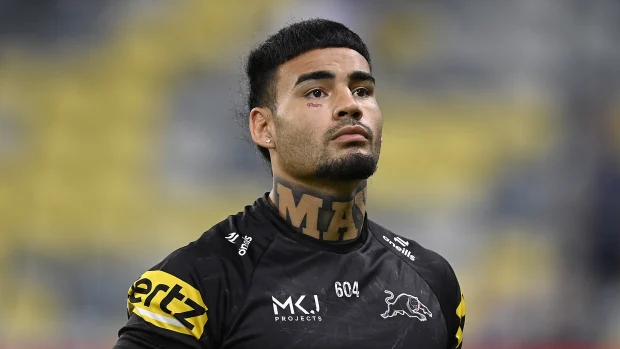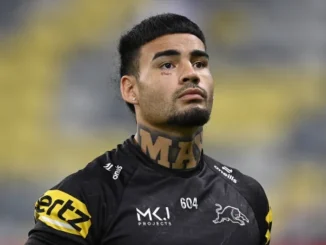
The issue with the Panthers’ decision to fire Taylan May
Regardless of how serious the charges are against Taylan May, the Penrith Panthers winger deserves the presumption of innocence, and also procedural fairness. Quite apart from it being the cornerstone of our entire justice system that Taylan May must be presumed innocent of the criminal charges laid against him unless it is proved in court that he is guilty beyond a reasonable doubt, another thing is important to note.
It might well be the case that he is innocent. Just as St George Illawarra’s Jack de Belin is innocent, having never been convicted of a crime after the Director of Public Prosecutions opted in 2021 not to pursue a third trial for him on sexual assault charges when two previous attempts to convict him resulted in hung juries. Yet de Belin missed three years of a career now nearing its end due to the no-fault stand-down policy. Sure, he was paid the whole time, but that is not the point.
To backtrack, it is presently alleged by NSW Police that on the night of April 8 this year, May punched his wife in the face and elsewhere on her body. Arising from those allegations, May was last month charged with three offences. He’s not next due in court to face those charges until March 2025.
Last week the NRL, rightly, enacted the discretionary component of its contentious no-fault stand-down policy to prohibit May from playing in – or otherwise being involved with – the competition until his criminal proceedings are finalised.
What that means in practice is that May can’t play or train for the Panthers – or otherwise participate in their activities – for the balance of the 2024 season and for an indeterminate period thereafter.
May’s problems, though, don’t stop there. That’s because the actual consequences of applying the no-fault stand-down provisions can operate in a peculiar and punishing way not only on the player – and that is the inevitable and necessary consequence of having the rule in the first place – but also the player’s employer, in this case the Panthers.
NRL clubs simply aren’t adequately compensated for, first, the loss of a key player; and second, the actuality that they have to keep paying that player under the salary cap for the duration of the player’s ban. Sure, there may be some fractional dispensations proffered, but not on a like-for-like, dollar-for- dollar basis.
In other terms, even where a club can replace a player benched through operation of the no-fault stand-down policy, it’s not as if there’s an endless production line of replacement players from which the affected club can choose. It’s an entirely imperfect system, even if the system is necessary.
I reiterate the point already made: May’s problems don’t end with being forced to take indefinite leave. That’s because, notwithstanding that in late March this year he inked a $1.2 million, two-year extension on his Panthers contract to remain at the foot of the Blue Mountains until the end of the 2026 season, moves are presently afoot to bring the continuation of that arrangement into sharp debate.
Specifically, the Panthers have, by all reports, issued May with a notice under his playing contract, alleging other breaches, involving May posting expletive-laden social media posts and filming himself as a passenger in a speeding car.
Pausing there, a couple of observations are necessary. First, whereas the Dragons stood by de Belin through the entirety of his interactions with the criminal justice system, it’s perhaps inevitable that many clubs would prefer not to be so loyal, such is the reputational stain and financial consequence of having a player on your books who can’t actually play.
What would a club do if it had three players stood down in those circumstances? What about five?
There’s only so much elasticity in the rubber band, which is the NRL’s salary cap, even accounting for the moderate dispensations that might be offered.
Second, all NRL players are bound by the terms of standard player contracts, which mean they have to abide by the NRL’s code of conduct, and principles such as not acting in a manner which is detrimental to the best interests and image of the game. It’s hardly surprising that some clubs will take their own action, regardless of the adverse effect on a player’s rights.
Third, while all NRL clubs have, baked into the standard playing agreement, the right to issue a breach notice to their players regarding allegations of contractual breach, the notion of a club “ripping up” a player’s contract is fanciful.
May is entitled to a proper process of being notified of the breaches alleged against him, the particulars of those alleged breaches, and the evidence on which the Panthers rely. He’s entitled to lead evidence and make submissions in his defence, through lawyers he instructs. He’s entitled to have decisions made about his future employment in a way where the decision isn’t already made before he walks in the room.
Fourth, to whatever extent the allegations of May’s misconduct relate to the period before he and his employer signed a contract extension on March 22, 2024, it’s difficult to understand how the club could rely on those allegations as grounds to sanction him if it knew about the alleged misconduct when that deal was signed.
Fifth, any sanctions that might eventually be imposed on May must be referable and proportionate to any specific misconduct proved against him. However idiotic it may be to perch yourself in the co-pilot seat of an Audi R8 as your mate redlines it while passing through a school zone, and however idiotic it might be to film the entire escapade, is that a sacking offence?
I’d venture to say not, despite the arch-stupidity of the whole episode. The Panthers’ board of directors may have an opposite view, which is their right if a procedurally fair process plays out that way. The problem, though, is that it might be perceived that the board is engineering a defined endpoint based on the limited material it can consider.

Be the first to comment